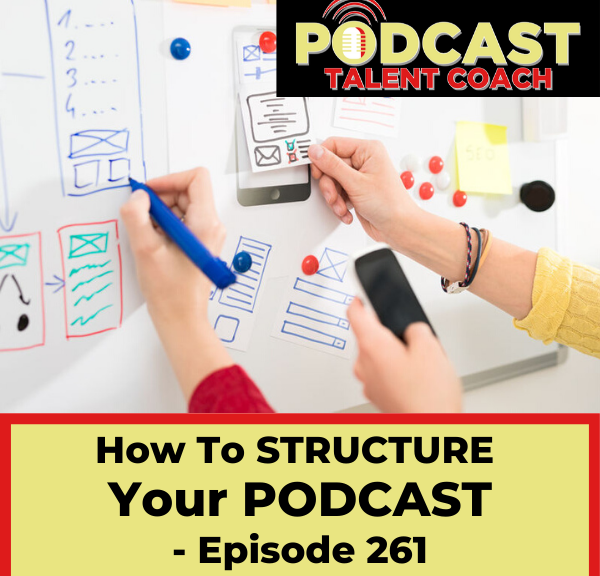Podcast: Play in new window | Download
Subscribe: RSS
So many people feel structure will take away the opportunity to create and be spontaneous. My degree in architecture and career in radio proves that many people are very creative within a framework and structure. The framework actually gives your creativity focus. Focus is exactly how a show clock for your podcast benefits you.
A show clock is basically where your elements will fall during the episode.
LATE NIGHT
Think of a late night talk show. They have the opening skit. It is followed by the show open. The host is introduced and he does his monologue. That might be followed by some sort of skit or short. The host then interviews two or three guests. Maybe a band plays to close the show. Finally, the credits roll.
That format would be a show clock. Now, on each episode, the team simply fills in the parts. What is in the monologue? Do we have a skit or bit tonight? Who are the guests? Who is the band? Do we need to make room for anything else?
The show clock and grid provides the continuity and comfort for the viewer or listener while still allowing the host and team to be creative.
We need a skit on the show tonight. Is it going to be viewer letters, karoke or man-on-the-street? Maybe Dan wrote something new that we can add in. You have the framework. It is now up to you to design within that framework.
ARCHITECTURE & RADIO
When I tell people that I have a degree in architecture, but have spent my entire career in radio, they look at me like I have two heads. How does architecture turn into radio? They are nothing alike.
Actually, architecture and radio are quite similar. To be successful in either discipline, you need to be both creative and analytical at the same time. In architecture, you are given a set of requirements in which to use your creativity.
The architecture client might say, “We need a 2-story clubhouse for an exclusive golf course, along with 2 tennis courts, a pool, a dining room that seats 200 yet can be divided, and a garage to store the golf carts.” Now, go create.
The radio client might say, “We are opening a new location out west. We need to attract people there in the first two months. We need a commercial that stands out from the other stores in our industry.”
Or the boss might say, “We need to attract as many listeners to our morning show while still playing 8 songs an hour. You need 3 traffic reports, 10 minutes of commercials and 2 weather reports. Be funny.”
How do you get it all in? You create a framework that helps you focus on the important information that will move the needle and help you be successful.
If you have a podcast that is serving as a marketing tool for your business, you need to make sure you have carved out time to market your business while still entertaining the audience.
We are going to compare how four podcasters structure their show around their business. They entertain and provide useful, valuable information while still attracting clients to their business.
SCHOOL OF PODCASTING
Dave Jackson – School of Podcasting – Sells podcast consulting and a membership – podcast is 43 minutes.
:00 – Episode tease
:15 – Recorded open jingle
:23 – Dave introduction of the podcast
:58 – Dave episode introduction
1:30 – Promote the deal at the website
2:00 – Topic 1
20:00 – Question of the month
25:00 – Membership promo
25:15 – Book recommendation
26:00 – Final answer to question of the month
27:45 – Next question of the month question
30:00 – Topic 3
37:09 – Topic 4
41:25 – Tease for next episode
42:30 – Show close
42:45 – Outtakes
NATURAL BORN COACHES
Marc Mawhinny – Natural Born Coaches – Sells consulting for coaches – Podcast is 29 minutes.
:00 – Before we start the show – 10 Clients in 90 Days program
:30 – Recording intro to the show
1:00 – Marc’s introduction of the episode and guest
1:45 – interview begins
26:00 – Where can people find the guest?
26:50 – Recap of the guest
27:05 – Recorded close
ARMANI TALKS
Armani Chowdhury – Armani Talks – Sells soft skills coaching – Podcast is 8 minutes.
:00 – Armani introduction of the podcast
:20 – Today’s episode introduction
1:00 – Topic 1
7:40 – Lesson from today
8:05 – Call-to-action
8:25 – Show close
READING WITH YOUR KIDS
Jedli – Reading With Your Kids – Sells marketing services for children’s books – Podcast is 33 minutes.
:00 – Recorded introduction
:05 – Jedlie’s podcast introduction
:40 – Jedlie’s show introduction
:45 – RWYK Certified Great Read promo
1:45 – Guest introduction
2:00 – Interview
29:25 – Plug guest’s contact information
30:10 – Interview wrap
30:30 – Tease of next episode
30:45 – RWYK Certified Great Read promo & plug
32:08 – Thank of people that make the show possible
32:26 – Host show close
32:40 – Recorded close
YOUR CLOCK
Whether your show is 8 minutes long or 43 minutes long, it needs a show clock. You need to remind yourself to promote your business. You also need to schedule where and how that will happen.
That is where a show clock comes in. The clock helps you schedule the various parts of your show. My Podcast Talent Coach Show Clock Worksheet will help you put it all together.
Get my show clock worksheet at PodcastTalentCoach.com/clock.
You can find my podcast and other tools to help you create great content at www.PodcastTalentCoach.com.

